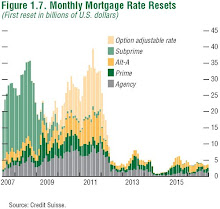
The font is too small to read so let me translate: greatest bubble in the past - scaled to 125%. Today - scaled to 200%.
Let's just say I am not being paranoid (for once) when I say this will take a little while to come back to reality.
Observations on the markets with realistic optimism

Lehman Brothers faces the threat of legal action by municipal councils in Australia over the sale of high-risk collateralised debt obligations by the Wall Street bank’s local subsidiary, Grange Securities.
The Bank of England joined four other big central banks around the world yesterday in emergency action designed to prevent the worsening credit crunch derailing the world economy.
Yale University next month plans to announce a student aid plan that could rival Harvard's initiative to ease costs for ``middle-income'' families.
Harvard University will cut the costs of attending the Ivy League school by as much as 50 percent for families that earn $120,000 to $180,000 a year, making access easier for ``middle-income'' students.
These families will pay 10 percent of their yearly earnings to send a child to Harvard, the Cambridge, Massachusetts, university said today. The payments decline on a sliding scale, with those making less than $60,000 attending for free. The school also eliminated student loans, saying they will be replaced by grants as needed.


